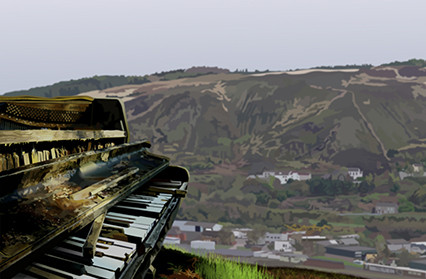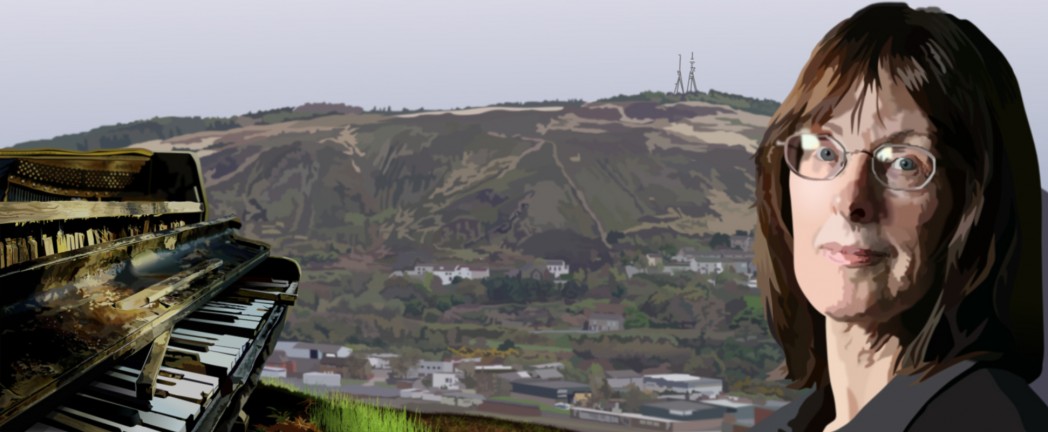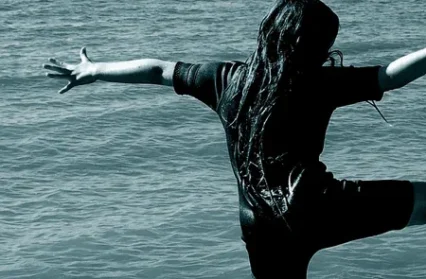The piano’s held together, I explain over the phone, with elastic bands and string: well, in a manner of speaking. It’s an heirloom: been in my brother’s garage for years and in a ruined farmhouse before that. I’ve no idea if such a wreck can be salvaged – but perhaps he might just look it over?
Bang on time, Owen Rhys stands at the door with his toolkit, a boyish-looking, old-fashioned guy in corduroy, fortyish, his abundant hair side-parted – softly-spoken and courteous. Leaving him to take stock of the patient, I settle in the attic study. Even here, you can hear the piano’s falsity and confusion.
– Tia, calls the tuner, – Never say die.
– Really? You can do something with it?
– Certainly. But – what’s the history of this piano? Because – this’ll sound odd – I may recognise the instrument. I’m almost sure the person who last tuned it was my dad.
Down on his knees, Owen studies the instrument’s dusty back. – Ah. Here we are. Perhaps. Can you see?
I crouch beside him. What am I supposed to be seeing? The wood’s a chaos of score-marks. I put it down to Mother Nature running amok while the piano slept. Slept for years, decades, and lost – in the wake of fratricidal family conflict – its mind. The family’s unappeasable jealousies built and boiled through time, for reasons no one now recalls. We youngsters, university-educated, got out. I fixed on New Zealand. It’s our antipode, I told myself: should be safe enough there. Decades later I’ve returned, to salvage an inheritance.
There’s a mark, apparently, which I’m implored to confirm, the sign, the tuner says, and his voice cracks, of his lovely dad. – Here look. ‘O.R. LLAN. RECREAT’. Latin for ‘Owen Rhys of Llangyfelach restored this.’ See? Can you see it? Clear as day.
When he straightens up, there are alarming tears in the tuner’s eyes and he accepts a cup of tea.
– I was apprenticed to Dad, he tells me. – He indentured me, binding me for five years. He signed, I signed. It wasn’t a legally enforceable document, just a pact between the two of us. It’s so moving to see this piano. If it’s the one. Yes, it is, you saw his mark. Our firm has been restoring pianos for a century and there’s a pride to it, you know, folk trust us. A rival company had just set up – Kleinkind’s – it worried dad, not least because Kleinkind saturated the market with cheap Chinese pianos, a thousand pounds a go. Rubbish pianos.
– But Chinese instruments are the best in the world, aren’t they, Owen?
Whatever’s so special about my piano, I wonder, that has him searching into those underground places of the heart – wells where old tears collect, their salt a barren solace?
– Aye, Tia, nowadays Chinese pianos are second to none. Different story then. These were all duds. The first we really knew was when we were called out to a piano in Treforys. Dad got to work when – pow! a string snapped – great bang, like a bomb going off. Another string – pow! It lashed him in the face, under the eye, he had the scar the rest of his life.
– Dad told the owner, – Can’t do anything with this, boy. You’ve been sold a pup. Complain, take it back. It’s lethal.
– It pained him to see people palmed off with junk. And he saw more and more of it. He made a pretext to visit Kleinkind’s workshop. It was attached to a warehouse. Like a hangar it was – relic of the old steel works, down where the enterprise park is now – packed wall-to-wall with these clones, as far as the eye could see. Honest-to-God, it was like the terracotta army in the emperor’s tomb. You had to see it to believe it. And Dad said it was a vision of the future, of apocalyptic decline. Chapel he was, see. What Kleinkind did was, when customers complained, he just swapped their rubbish piano for a new rubbish piano. Once the three-year guarantee was up, end of.
– I suppose your father confronted him?
Is my piano somehow under suspicion? It couldn’t logically be. Mine’s inherited. I love it anyway. Even if it has to be eviscerated and I’m left with an empty shell. I remove the mugs as a hint that tuning should commence. But Owen follows me into the kitchen and insists on drying up, still talking. My neighbour but two is a talker like this. When I see her coming I hide in the garage. Nobody’s spared.
And yet I like the guy. The gentleness of him, the dark, kindled eyes. The sense of family pieties: who else do I know – aside from myself – who loved their father so profoundly that the rest of life bore the mark of sorrow? And perhaps he intuits this kinship. Although of course mine was a quarreller like the rest of the Francises – emotional, hot-tempered, puzzled that the root of love should turn out so cloven. I see in my mind’s eye his baffled eyes – and I have to turn away inwardly, softly closing the door on him.
– Kleinkind was a charmer, Owen goes on. – No getting away from that. Where do you hang the tea-towel, Tia? Gentlemanly chap, mind – impeccable manners. Instead of defending himself when Dad accused him, he parried with a question: how many working men in the Valleys can afford quality instruments for their kiddies, would you guess, Mr Rhys? Quality? It was the first time in my life I heard Dad raise his voice. After that he was on a mission, I don’t think he was ever quite himself again – or, yes, perhaps just, briefly, once. I’ll come to that. He’d tune people’s pianos for next to nothing. Thing was, he felt he’d seen the End. But he reasoned that he could in some way arrest this process of … untuning. Piano entropy. Dad was the boy with his thumb in the dyke. He even undertook to restore rogue imports – more or less rebuilding from scratch. I do believe these pianos killed him. Mam was very bitter.
– But you’re not saying, are you, that my piano is –
– Good God no. Venerable instrument is this, Tia. Sorry, I’ll stop my chopsing and get down to work. Funny old world though, isn’t it? Let’s gauge the timbre first.
Owen begins to play: Bach’s Wohltemporierter Klavier. I realise at once that he’s no mean player, despite the reverberations that roar round the instrument’s body and explode out in frenzy.
– You may well flinch! Each piano’s different, see. Timbre’s determined by the harmonics – different harmonics for the same pitch. A little inharmoniousness lends richness to the tone. You didn’t know that? Well, your instrument’s a challenge – but, Tia, it’ll be worth it to you, I promise, if it takes all day. I’ve got a packed lunch in the van.
– Eat with me. Of course, Owen. I’ve made soup.
*
– You see, he says, breaking open a warm crusty roll and smothering it in melting butter, – Dad was pious, that’s true. Straight-dealing – modest to a fault. But he had a zany sense of humour and plenty of hwyl. He’d dance Mam all round the house, singing at the top of his voice. All that went out the window, once he started trying to resurrect pianos. He’d been a tender father – hands-on they’d call it nowadays. One of the old Gower swimmers: he’d swim way out at Pwlldu with me on his back. I never felt afraid. And no matter what comes later, Tia, if you’ve enjoyed such childhood security, nothing mars it. Even when the rage infected him and he quarrelled with the deacons. And started boasting that nothing was beyond his powers. The real man was still there, behind the rage.
– You see, he’d undertaken a labour impossible for one craftsman, stacking the odds against himself. Me he saw as a fellow-crusader and successor in the battle against these profane imports. Not easy for an adolescent lad. I had a sober sense of filial duty – but I’d drag my heels and roll my eyes. Dad sued Kleinkind – and lost. And Kleinkind threatened to sue us. That case never came to court. I must admit I was ashamed of Dad, muttering to himself, his face all mottled. He signed the pianos he’d restored so he could make account of himself at the end of time.
– One day we were called to a farm towards Kilvey.
I take a mouthful of water. I know where this is going. Owen has led me to Cae Twmpyn Farm; to my grandmother and her barricades. The livestock sold off and the pyre of fifty pound notes. To the moment when her children came to blows at the farm gate and Uncle John nearly lost an eye and Auntie Gwen went charging like a bull across the cobbles at my mam. To the beginning of the end.
– Yes, I say. – I know the area.
*
We park outside Cae Twmpyn, the tuner and I, in his van which smells of linseed oil and menthol. The farm was once a tenancy of the Kilvey manor, its mediaeval curtilage defended by towering walls. We grandchildren knew every field by a corruption of its ancient name: they’d been worked by our family for centuries. Owen and I pass the mounds after which the farm was named: twin tumps, a hundred yards apart, where once a Bronze Age cinerary urn was excavated containing fragments of human burial. When the longed-for snow came we’d toboggan down the slopes. On the south-west side the ground slants down to the cliffs above the sea, a grey shining triangle between headlands, with a little beach when the tide’s out. Nobody farms there now. There’s a caravan site on the lower field.
As we enter the grounds I breast the memory of Gran’s barricades. How picturesque ruined houses look when they weather into the earth. Grass carpets her rooms, her walls are yellow and orange with lichen and fireweed thrusts up seven feet tall.
– Yours was the last piano Dad ever restored, Owen says as we perch on a broken wall. – And he died three weeks later. The farmhouse even then looked distinctly seedy. A birch had rooted by the chimney, I remember, and tiles were slipping. When we knocked, no one answered. So we went round the back and tapped on the windows. Eventually an elderly lady appeared. Pale blue eyes, piercing. Rather formidable. I remember her clear as day, I’ll explain why in a minute. Indoors it was, well, a mess. The old lady said she was living a student’s life and couldn’t be bothered to clean. I thought she was a bit – you know. Dad set me to sweep the room, which I did with a poor grace. He snarled that for all he cared I could go and work for Kleinkind in his junk yard if I took that attitude. I said nothing but my expression must have riled him because he told me to get out of his sight and ask the old lady if she wanted any jobs doing.
– So did you?
– I did. And she said, – Yes, young man, I wish to go for a swim.
– A swim?
– In the sea. I thought at first she was having me on. Eventually back I traipsed to Dad. Scarlet-faced. She wants me to go swimming with her. Well, that tickled him. He burst out laughing and his old, soft self was back – as if it had just been biding time. Mind you, I was hardly in a mood to appreciate that. I drew myself up to my full five foot four and told him it wasn’t in my contract that I had to go swimming with old grannies. And I wouldn’t, he couldn’t make me. He laughed harder and said, Tell her we’ll all go together when this is finished.
– And did you, Owen?
– Mortifying it was. Yet now it seems a blessed interval. Your gran was quite a woman, Tia, and no mistake. She was an original. Whatever was she like in her heyday if this was how she was at eighty? The embarrassment! – didn’t know where to look. My dad and your gran swam out, way beyond my limit. I saw them basking out there, floating on their backs, water like a millpond, chatting away presumably. And later he played to her. Chopin.
What Owen has tendered me feels like breaking news. I cwtch it up in my heart. I can’t stop smiling. I want to cry. I remember playing the recorder to my gran and how all the asperity left her as she listened. Driving back, we’re both silent, side by side, like shy cousins many times removed. Yes, like distant kin, whose stories mesh at one seam only.
I wish Dad could have heard this. His tales were of bewildered rejection. Of loving too much and being short-changed. Of a taciturn dad with fists. Of a mother who signed off from being a mam once her husband was underground. Greedy bloodsuckers, she called her adult children. After she’d burned her savings, Gran slapped her hands together, as if to say: Good riddance. From now on she was just going to be herself. She reverted to her maiden name. Dad described his sister rooting in the bin amongst the ashes of a fortune in twenty- and fifty-pound notes.
My Uncle Bryn took steps to get Gran committed. Nothing doing. She’d got the local doctor in her pocket, so Bryn said. And the social workers were impressed by her intellectual grasp. They said she talked to them about her OU studies and feminism and played for them on her piano. And oh, a lovely cup of coffee she do make, they said, as if that clinched the matter. The family solicitor leaned back in his chair and informed Bryn that it wasn’t arson to burn a fortune, though it might be construed as eccentric or subversive. On the other hand, people poured fortunes down the drain every day in bad investments or high living.
– Your mother has left a will, he said. – There’ll be enough for her funeral. And just the one small bequest. I cannot divulge that to you.
Meanwhile at Cae Twmpyn the farmhouse descended into senility. Nature ran wild in there. Convolvulus vines overwhelmed the piano, covering it with their white trumpets. Insidious tendrils lifted the lid, clasping the hammers and strings, soundboard and bridges. Year by year as the bindweed rotted, it left a scurf of dry brown dust that began to fill up the cavity. Moths laid eggs on the bindweed and larvae pupated on the keys. Snails festooned the inlay with slime that dried to a map of roadways.
Until the day came to call it home from the dead.
Illustration by Dean Lewis













